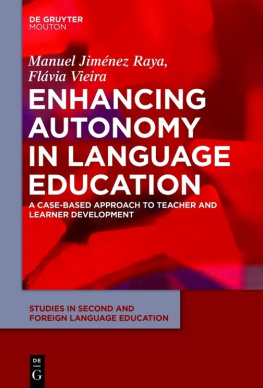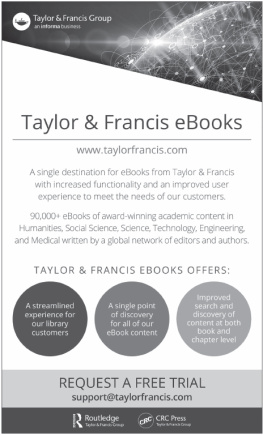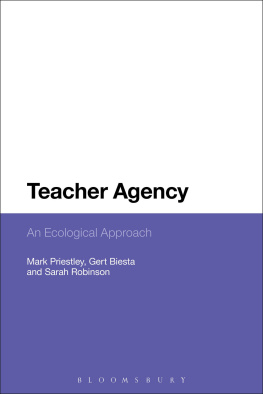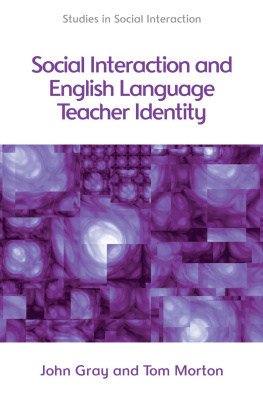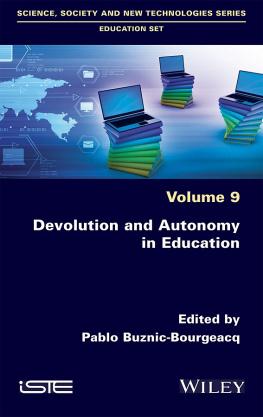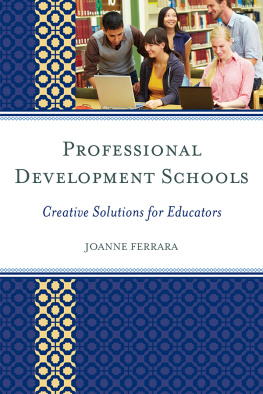Manuel Jiménez Raya - Enhancing Autonomy in Language Education
Here you can read online Manuel Jiménez Raya - Enhancing Autonomy in Language Education full text of the book (entire story) in english for free. Download pdf and epub, get meaning, cover and reviews about this ebook. year: 2015, publisher: De Gruyter Mouton, genre: Religion. Description of the work, (preface) as well as reviews are available. Best literature library LitArk.com created for fans of good reading and offers a wide selection of genres:
Romance novel
Science fiction
Adventure
Detective
Science
History
Home and family
Prose
Art
Politics
Computer
Non-fiction
Religion
Business
Children
Humor
Choose a favorite category and find really read worthwhile books. Enjoy immersion in the world of imagination, feel the emotions of the characters or learn something new for yourself, make an fascinating discovery.
- Book:Enhancing Autonomy in Language Education
- Author:
- Publisher:De Gruyter Mouton
- Genre:
- Year:2015
- Rating:3 / 5
- Favourites:Add to favourites
- Your mark:
- 60
- 1
- 2
- 3
- 4
- 5
Enhancing Autonomy in Language Education: summary, description and annotation
We offer to read an annotation, description, summary or preface (depends on what the author of the book "Enhancing Autonomy in Language Education" wrote himself). If you haven't found the necessary information about the book — write in the comments, we will try to find it.
Enhancing Autonomy in Language Education — read online for free the complete book (whole text) full work
Below is the text of the book, divided by pages. System saving the place of the last page read, allows you to conveniently read the book "Enhancing Autonomy in Language Education" online for free, without having to search again every time where you left off. Put a bookmark, and you can go to the page where you finished reading at any time.
Font size:
Interval:
Bookmark:
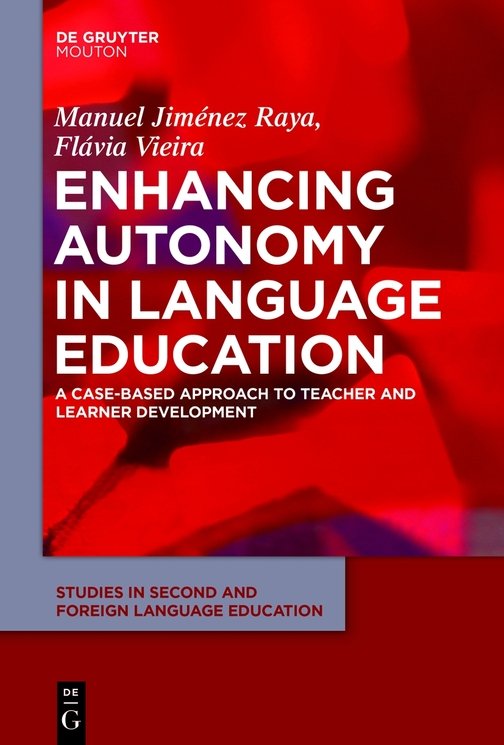
This book was written with the intention to address two interrelated concerns about teacher education and school pedagogy:
- how can teacher education become a powerful space for enhancing democratic educational change that integrates teacher and learner development?
- how can teacher education integrate and enhance professional knowledge so as to promote teacher empowerment and (inter)personal transformation?
Based on the specialised literature and on our experience as teacher educators and educational researchers, we proposed an ethical and theoretical framework for the integrated development of teachers and learners towards autonomy in language education in a school context. Autonomy is conceived as a collective interest in the service of democracy, and also as a personal competence to develop as a self-determined, socially responsible and critically aware participant in (and beyond) educational environments, within a vision of education as (inter)personal empowerment and social transformation (Jimnez Raya, Lamb, and Vieira 2007: 1). Within this framework, we proposed and illustrated a case-based approach to teacher education that seeks to provide answers to the above questions.
We assume that teacher and learner empowerment entails a democratic stance and a re(ide)alistic practice, thus embracing the idea that teaching and teacher education are moral and political activities that seek to disclose and counteract barriers to transformation. Because schools are complex scenarios where humanistic concerns co-exist with a growing rise of technocracy, bureaucracy and accountability, teachers need to manage and find a way through conflicting rationalities with the purpose of enhancing education as a space for empowerment. Case-based teacher education can help fulfil this purpose because it entails a deep concern with the complexity and uniqueness of professional experience and a deep belief in teachers agency as critical producers of knowledge and enactors of change.
In an era of supercomplexity (Barnett 2000) teachers need to develop a capacity to think critically, analyse issues from various angles, manage ambiguous problems, communicate with different stakeholders, take on leadership in curriculum development, and learn throughout life because one never learns to teach once for all. It is a continuous, ongoing, constantly deepening process (Shulman 2004a: 517). The challenge for teacher education for learner autonomy is to help student teachers and practising teachers to think in powerful ways about education and find strategies that enable them to address constraints in their struggle for an education that is more rational, just and satisfactory. Improving the quality of learning requires improving the quality of teaching, but the quality of teaching can only be improved through the implementation of educational policies and teacher development programmes that encourage and effectively support professional autonomy. As Feiman-Nemser indicates, Unless teachers have access to serious and sustained learning opportunities at every stage in their career, they are unlikely to teach in ways that meet demanding new standards for student learning or to participate in the solution of educational problems (2001: 10141015).
Without the competence to engage critically and without a strong professional identity teachers may find it difficult to assume responsibility for curricular decisions. Research on teacher professional development has emphasised the centrality of teacher involvement in pedagogical inquiry to create knowledge about curriculum development and educational processes in collaboration with higher education institutions and others. In order to become leaders of educational thought, (prospective) teachers should acquire the willingeness and ability to develop a critical view of education, to disclose constraints to autonomy and open up spaces for manoeuvre, to centre teaching on learning, and to interact with significant others in their professional communities (Jimnez Raya, Lamb, and Vieira 2007). Teachers as the central agents of (modern language) education need to feel that they are part of the process of building a school climate in which they themselves, administrators and education experts cooperate to improve students learning, to increase the power of teaching, and to redesign the curriculum.
We strongly believe that a case-based approach to teacher education can foster pedagogy for autonomy by helping teachers explore the space of possibility, that is, what can be, shortening the distance between reality and ideals. Case pedagogy is based on the assumption that knowledge is constructed, built on prior knowledge, linked to experience, permeable, evolving, and consequential. Since teaching represents an ill-structured domain characterised by uncertainty and ambiguity (Spiro et al . 1987: 2), case pedagogy can be used to help teachers understand the contingent and contextualised nature of teaching (Grossman 1992: 231) and provide them with insights into alternative solutions to pedagogical problems rather than correct answers. Encouraging teachers to appraise different solutions from various perspectives (e.g., normative, interpretive, and critical standpoints) will promote professional reasoning. Cases convey contextual knowledge and give teachers the opportunity to understand the situated nature of evidence, the interrelationship between practical and theoretical knowledge, and the moral and political nature of teaching (L. Shulman 1986b; Harrington and Garrison 1992; Fenstermacher and Richardson 1993). In trying to promote pedagogy for autonomy, a case-based approach also avoids attitudes of disbelief and scepticism common to many teachers who think that autonomy is a utopia or a theoretical construct that has nothing to do with life in classrooms. By analysing narratives of autonomy-oriented experiments and by experimenting with autonomy themselves, teachers learn that pedagogy for autonomy can be promoted in many different ways and to varying degrees, with significant implications for the quality of teaching and learning. This is what happened in the experiences reported in , where teachers and student teachers reconfigured their willingness and ability to promote autonomy in language education and became more hopeful in a better future for education.
Case pedagogy presupposes that cognition is a social and situated phenomenon (J. Shulman 1992; Sykes and Bird 1992). If all knowledge is situated in and grows from the contexts of its use, then learning to teach should also be situated in sites of teaching and learning (J. Shulman 1992; L. Shulman 1992; Richardson 1991). According to Sykes and Bird (1992), coupled to the indexical character of conceptual knowledge there is an emphasis on the activity within which concepts are used. Thus, the promotion of conceptual understanding requires attention to situations of use. Sociocultural theory (Vygotsky 1978, 1986; Smagorinsky 1995) stresses the social nature of learning by positing that the social and the individual are, according to Cole (1985: 148), mutually constitutive elements of a single, interacting system. Learning encompasses the use of cultural and symbolic tools such as language, texts, and experiences to forge understanding of the subject under study (Smagorinsky 1995) while we engage in specific activities within specific environments (Rogoff 1990; Tulviste 1991). Because knowledge is situated, it is partly a product of the activity, context, and culture in which it is developed and used.
Case-based pedagogy can create rich learning environments to mediate teacher thinking and action with reference to assumptions and principles of pedagogy for autonomy. Experience and language assume a central role as mediating tools and case pedagogy can be conceptualised as a form of pedagogical inquiry developed through a reflective conversation with experience whereby our perceptions, appreciations, and beliefs are rooted in worlds of our own making that we come to accept as reality (Schn 1987: 36). This does not entail, however, a solipsistic attitude in professional development. Teacher educators and teachers seek to build a dialogic understanding of experience that conciliates theoretical with practical concerns, using multiple frames of reference to (re)shape thought and action. Because cases are cases of something, learning from and with them entails an articulation between the particularities of teaching and the ethical and theoretical rationales that can help us scrutinise the justifications and implications of pedagogical choices, as well as the historical and structural forces that may restrain or facilitate the development of autonomy in schools.
Font size:
Interval:
Bookmark:
Similar books «Enhancing Autonomy in Language Education»
Look at similar books to Enhancing Autonomy in Language Education. We have selected literature similar in name and meaning in the hope of providing readers with more options to find new, interesting, not yet read works.
Discussion, reviews of the book Enhancing Autonomy in Language Education and just readers' own opinions. Leave your comments, write what you think about the work, its meaning or the main characters. Specify what exactly you liked and what you didn't like, and why you think so.

